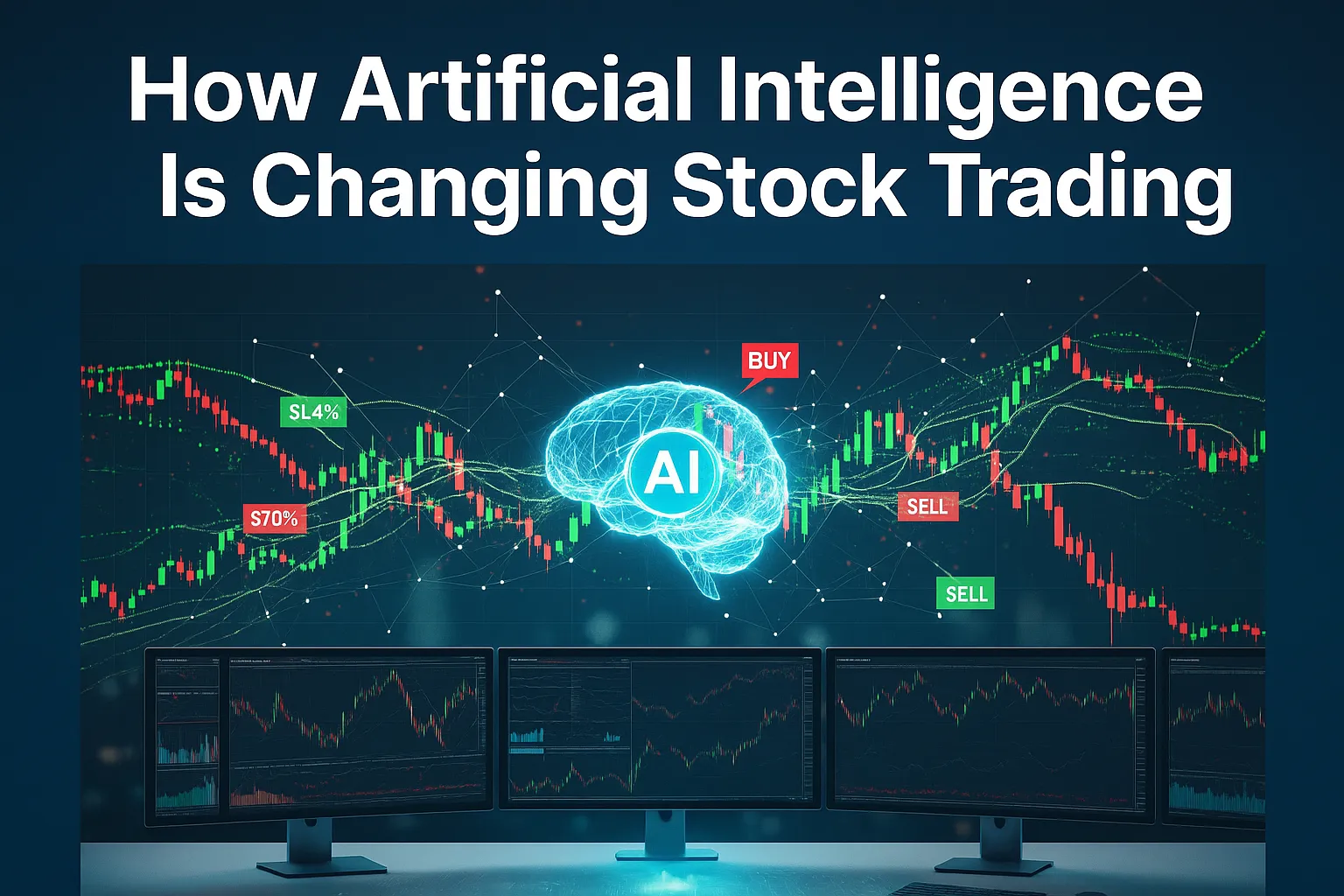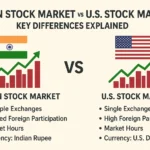What Is Artificial Intelligence in Stock Trading?
Artificial Intelligence (AI) in stock trading involves advanced algorithms and data-driven systems that analyze market data, recognize patterns, and execute trades with minimal human intervention. Unlike traditional trading, which relies heavily on human judgment, AI systems can:

- Process vast amounts of financial data in real-time.
- Learn from historical market behavior using machine learning.
- Identify hidden patterns in price movements.
- Automate trade execution through algorithmic trading.
Explore more about AI’s impact on markets in our article on AI Stocks and the Magnificent Seven.
How AI Is Changing Stock Trading
Faster Market Analysis
AI algorithms analyze millions of data points, including stock prices, company reports, and social media sentiment, in seconds, enabling traders to identify opportunities faster than human analysts.
Predictive Stock Insights
Machine learning models use historical data and trends to forecast stock movements, giving traders a competitive edge in decision-making.
Algorithmic Trading
AI powers high-frequency trading (HFT), executing thousands of trades in milliseconds to capitalize on micro price differences and ensure market liquidity.
Risk Management
AI monitors market volatility, correlations, and anomalies, alerting traders to potential downturns and minimizing losses.
Personalized Investing
Robo-advisors like Betterment and Wealthfront use AI to create personalized portfolios based on risk appetite and market conditions.
Learn how global events impact trading in How Global Events Affect Stock Market Volatility.
Benefits of AI in Stock Trading
- Speed & Efficiency: AI executes trades faster than humans.
- Accuracy: Eliminates emotional bias in decision-making.
- Data-Driven Insights: Analyzes structured and unstructured data, such as news and tweets.
- Cost Reduction: Automates tasks, reducing the need for large trading teams.
- Accessibility: Enables retail investors to use AI-based trading apps.
Risks and Challenges of AI in Stock Trading
- Over-Reliance on Technology: System failures can lead to significant losses.
- Market Manipulation: AI could unintentionally amplify volatility.
- Lack of Transparency: Some AI models operate as “black boxes” with unclear decision processes.
- Regulatory Concerns: Governments are still adapting to AI’s financial impact.
- Bias in Data: Poor or biased data can lead to inaccurate predictions.
Real-World Applications of AI in Stock Trading
- Hedge Funds: Firms like Renaissance Technologies and Two Sigma rely on AI for trading strategies.
- Retail Trading Apps: Platforms like Robinhood and Upstox use AI to enhance user experience.
- Sentiment Analysis: AI tracks social media to predict stock movements, e.g., Tesla or GameStop.
- Fraud Detection: AI identifies unusual trading activity to prevent scams.
The Future of AI in Stock Trading
AI’s role in stock trading will expand with advancements like:
- Quantum Computing + AI: Enhanced processing power for faster predictions.
- Greater Retail Adoption: More investors will use AI-driven robo-advisors.
- AI + Blockchain: Combining transparency with AI decision-making.
- Emotion AI: Analyzing human emotions to predict market movements.
For insights on investment options, read Mutual Funds vs Stocks in 2025.
Best Practices for Investors Using AI
- Start small with AI-powered trading apps.
- Cross-check AI predictions with fundamental analysis.
- Stay updated on AI regulations in finance.
- Diversify investments—don’t rely solely on AI strategies.
- Use AI as a tool, not a replacement for financial judgment.
For more investment strategies, visit Bloomberg Markets.
FAQs
Can AI predict stock prices accurately?
AI provides useful predictions based on data trends, but it cannot guarantee 100% accuracy due to unpredictable global events.
Is AI stock trading safe for beginners?
Yes, beginners can use AI-based robo-advisors, but they should start with small investments and understand the risks.
Will AI replace human traders?
AI will handle data-heavy tasks, but human judgment remains crucial for long-term strategies.
What are the best AI tools for trading?
Popular platforms include Trade Ideas, Kavout, Upstox Pro, and robo-advisors like Wealthfront.
How is AI different from traditional trading?
Traditional trading relies on human effort and bias, while AI-driven trading uses automation and objective data analysis.


